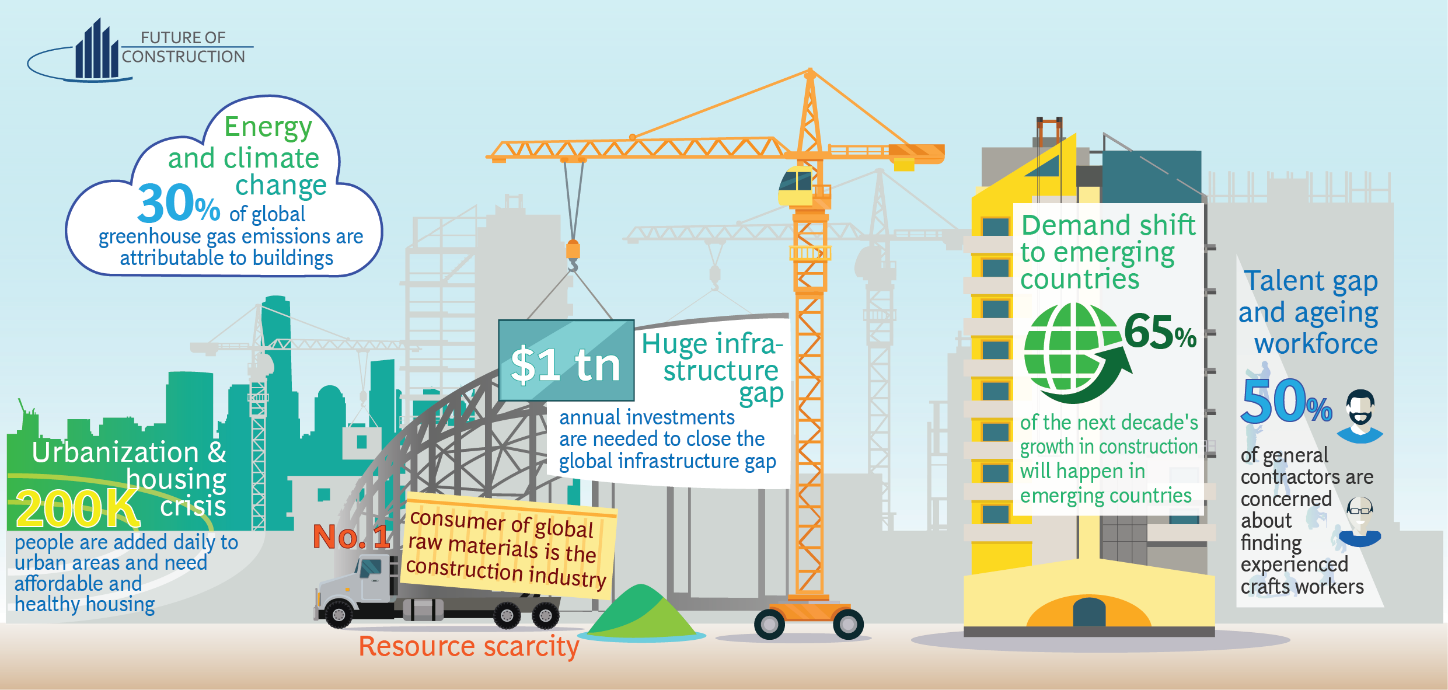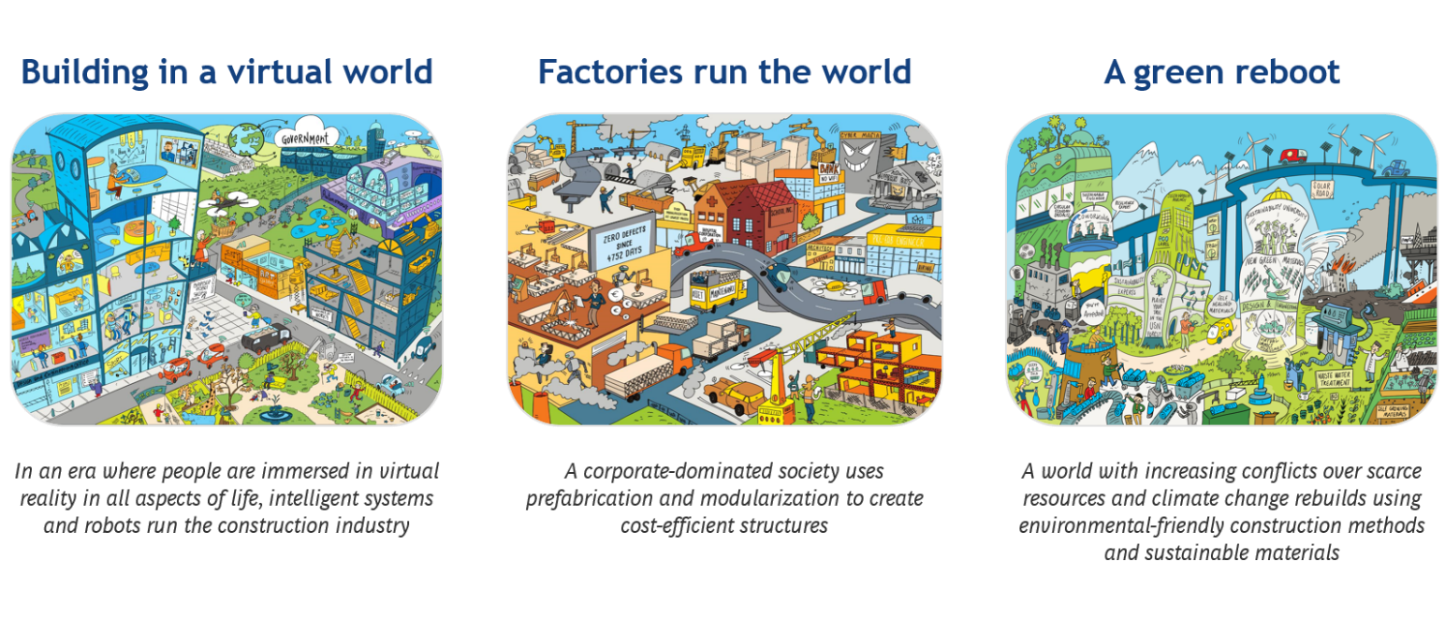6 ways the construction industry can build for the future

Disruption is unavoidable. Companies should start preparing Image: Reuters/Daniel Munoz

Get involved with our crowdsourced digital platform to deliver impact at scale
Stay up to date:
Cities and Urbanization
Over the past decade, digital technologies have transformed whole industries, ushering in the Fourth Industrial Revolution. Social media platforms and on-demand streaming services from start-ups such as Facebook, Spotify and Netflix have transformed media and entertainment. E-commerce giants like Amazon and Alibaba have disrupted brick-and-mortar retailers. Digital-based mobility companies are challenging old-line automakers. And the new technologies did not just satisfy consumer demands for better entertainment, shopping and transport. In those industries and others, innovations improved companies’ productivity and sustainability and reshaped the skills and competencies needed to thrive.
During the same period, however, the construction industry has continued operating as it has for the past 50 years, with a heavy reliance on manual labour, mechanical technology and established operating and business models. Productivity has stagnated as a result.
Now, digital technologies are gradually entering the construction industry, changing how infrastructure, real estate and other built assets are designed, constructed, operated and maintained. Those technologies include building information modeling (BIM), prefabrication, wireless sensors, automated and robotic equipment, and 3D-printing. The econonic and social impact could be substantial, as the construction industry accounts for 6% of global GDP and employs more than 100 million people worldwide. Within 10 years, full-scale digitization could help the industry save an estimated 12-20%, equal to between $1 trillion and $1.7 trillion annually, according to The Boston Consulting Group.

In parallel to the new technologies, there are several global megatrends that urge players in the construction industry to rethink long-established practices. Among the most impactful are fast urbanization, climate change, resource scarcity and a growing talent gap. The last of these is especially pressing. Already today, more than two-thirds of American contractors have difficulties filling key positions, while in the UK construction sector, hard-to-fill vacancies have more than doubled over the past five years. In other countries the talent gap is expected to grow further, given the imminent digital transformation of the industry and the new skills it will require.

Players along the construction industry’s value chain – architects, designers, engineers, building material suppliers, contractors, and operations and maintenance companies – need to prepare strategically and make the right moves to thrive amid the disruptions the new technologies and trends could cause. However, the myriad potential changes in the industry will make it difficult to predict the future. To help, the World Economic Forum, together with the Boston Consulting Group and more than 30 leading companies from the construction world, created three future scenarios to prepare the industry for a broad range of possible futures:
• Building in a virtual world. Artificial intelligence (AI), software systems and autonomous construction equipment replace most manual work throughout the engineering and construction value chain.
• Factories run the world. Construction activities move largely to factories and the industry uses lean principles and advanced manufacturing processes to pre-fabricate modules that are later assembled on-site.
• A green reboot. The construction industry uses sustainable technologies and new materials to meet tough environmental regulations.

It is still unclear which route construction will take, and very likely that the future will include elements of all three scenarios. Current business models, strategies and capabilities will not be sufficient in any of these future worlds. This underscores the fact that players along the construction value chain need to prepare strategically.
Many proposed actions relate only to a particular scenario, but six key actions will be relevant in any possible future.
• Attract new talent and build up required skills – as any future scenario requires talent with substantially different skills than today's workforce possesses, and adequate upskilling processes are largely not in place.
• Integrate and collaborate across the construction industry’s value chain – as the construction industry is characterized by a disintegrated and highly fragmented value chain, which hampers the seamless data flows and integrated systems that are essential in any future scenario.
• Adopt advanced technologies at scale – as the construction industry has been slow to adopt new technologies and still heavily relies on manual labour and mechanical technologies, resulting in poor productivity.
Further key actions are: to maximize the use of data and digital models throughout processes; to review existing product portfolios and embrace new business opportunities; and to enable change-management and adaptiveness.
The construction industry’s decision-makers need to understand the disruptions outlined in the future scenarios as wake-up call, and use the identified key actions as a foundation for companies to prepare and shape a prosperous future which allows them to fulfill their role in promoting economic growth, social progress and environmental responsibility.
Don't miss any update on this topic
Create a free account and access your personalized content collection with our latest publications and analyses.
License and Republishing
World Economic Forum articles may be republished in accordance with the Creative Commons Attribution-NonCommercial-NoDerivatives 4.0 International Public License, and in accordance with our Terms of Use.
The views expressed in this article are those of the author alone and not the World Economic Forum.
The Agenda Weekly
A weekly update of the most important issues driving the global agenda
You can unsubscribe at any time using the link in our emails. For more details, review our privacy policy.
More on Cities and UrbanizationSee all
Victoria Masterson
April 17, 2024
Victoria Masterson
April 12, 2024
Victoria Masterson
April 11, 2024
Sam Markey and Andrew Watkins
April 5, 2024
H. Kit Miyamoto, Olivia Nielsen, Ommid Saberi and Guido Licciardi
March 27, 2024
Victoria Masterson
March 26, 2024






